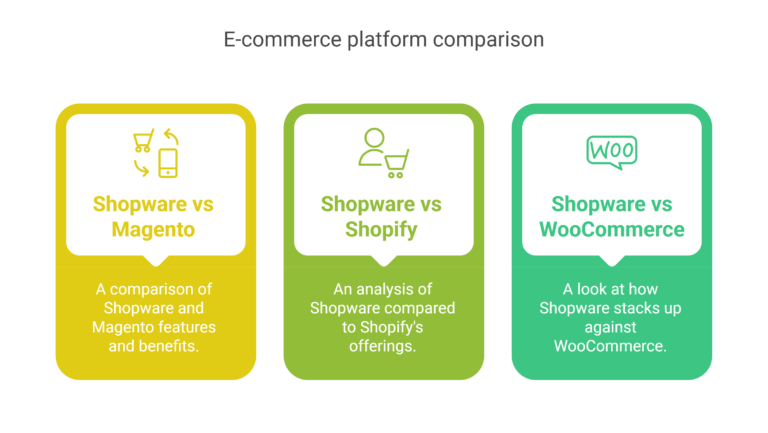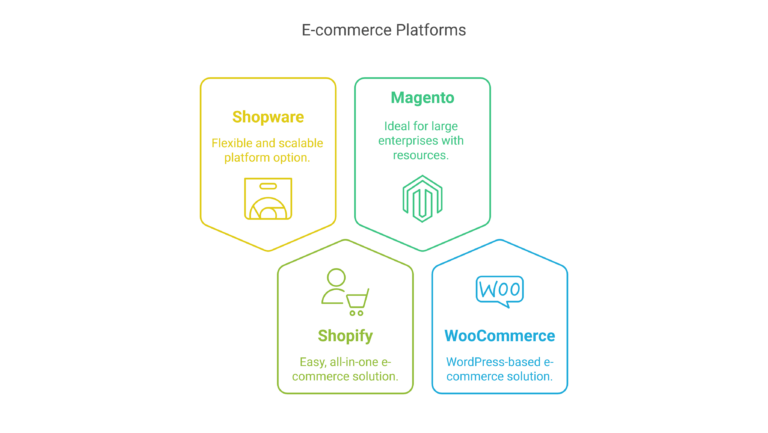Greetings! I'm Aneesh Sreedharan, CEO of 2Hats Logic Solutions. At 2Hats Logic Solutions, we are dedicated to providing technical expertise and resolving your concerns in the world of technology. Our blog page serves as a resource where we share insights and experiences, offering valuable perspectives on your queries.

Choosing the right e-commerce platform can define your success. With so many options available, it’s crucial to understand the pros and cons of Shopware, Magento, Shopify, and WooCommerce before deciding.
Understanding the Platforms
- Shopware: A flexible and scalable platform ideal for growing businesses.
- Magento: A powerful solution for large enterprises that requires technical expertise.
- Shopify: A beginner-friendly platform with a subscription-based model.
- WooCommerce: A customizable option for WordPress users.
Thinking of migrating? If you’re on WooCommerce but need better performance, Shopware could be a great choice.
What to Consider When Selecting an E-commerce Solution?
Choosing the right e-commerce platform involves more than just features, it’s about finding the best fit for your business needs, budget, and technical resources. Here’s a breakdown of key factors to consider before making your decision.
Ease of Use
While Shopify is the most beginner-friendly platform, Shopware and Magento typically require professional developer support for setup and customization. WooCommerce offers a middle ground; it’s relatively straightforward for WordPress users but may need technical expertise for advanced features.
Here’s what you should know:
- Shopify: Truly designed for non-technical users with drag-and-drop interfaces and minimal technical setup
- Shopware: Requires developer expertise for setup and customization, though its admin interface is user-friendly once set up
- Magento: Needs significant developer support and technical knowledge
- WooCommerce: Manageable for WordPress-familiar users, but complex features need technical help
Warning: Before choosing a platform, consider your technical resources. While Shopware offers powerful features, it requires technical expertise to leverage its capabilities fully.
Cost Comparison

Shopware is a robust e-commerce solution with initial setup costs ranging from €5,000 to €20,000, making it a mid-range option for businesses.
Magento represents the higher end of the market, with setup costs typically falling between €20,000 and €100,000 or more. This enterprise-level platform’s higher initial investment reflects its comprehensive feature set and scalability potential.
Shopify provides one of the most accessible entry points, with setup costs ranging from $0 to $5,000. The wide range accounts for different levels of customization, from using pre-made themes to developing custom solutions.
WooCommerce, as a WordPress-based solution, requires an initial investment of $500 to $5,000. This setup cost covers the basic installation, theme customization, and essential plugin configuration needed to launch a functional online store.
Shopify and WooCommerce work for small budgets, while Shopware and Magento offer more flexibility with higher investment.
Not sure about costs? Our experts can guide you through the best option for your business.
Features & Customization
Shopware and Magento are highly customizable. Shopify has limited flexibility but offers an extensive app marketplace. WooCommerce is open-source but depends on plugins.
Migration Insight: Migrating from Shopify to Shopware can unlock better customization and fewer restrictions.
Business Scenarios
Choose Shopware for a balance between customization and ease of use.
Go for Shopify if you want a hassle-free store.
Opt for Magento for enterprise-level needs.
Pick WooCommerce if you’re already on WordPress.
Performance & Scalability
Magento and Shopware handle high-traffic stores well. Shopify scales but has limitations on advanced features. WooCommerce’s performance depends on hosting.
Pro Tip
Ensure your hosting provider supports future growth before selecting a platform.
Security & Maintenance
Shopify offers built-in security, while Shopware, Magento, and WooCommerce require proper hosting and configurations.
Warning: Ignoring security updates can put your store at risk. Always invest in secure hosting and maintenance plans.
Support & Community
Shopify provides 24/7 support. Shopware, Magento, and WooCommerce have strong communities with premium support options.
Need expert guidance? Talk to our team about support options.
Shopware vs Other E-commerce Platforms
Choosing the right e-commerce platform is crucial for your business success. Here’s a detailed comparison of Shopware against Magento, Shopify, and WooCommerce to help you make an informed decision.

Shopware vs. Magento
- Customization: Both offer high flexibility, but Magento requires advanced development skills, whereas Shopware provides a more user-friendly experience.
- Scalability: Magento is enterprise-grade, ideal for large-scale stores, while Shopware scales efficiently without excessive development costs.
- Performance: Shopware’s API-first approach ensures faster performance compared to Magento’s resource-intensive nature.
- Ownership & Control: Magento offers full control but demands extensive development, whereas Shopware provides flexibility with easier management.
- Total Cost: Magento has high development and maintenance costs, while Shopware offers flexible pricing with a lower total cost of ownership.
Shopware vs. Shopify
- Customization: Shopify relies on apps for functionality, while Shopware allows deeper customization without heavy reliance on third-party tools.
- Scalability: Shopify scales easily but comes with higher transaction fees, whereas Shopware scales efficiently without additional hidden costs.
- Performance: Shopware delivers optimized performance, while Shopify may slow down with heavy customization and third-party apps.
- Ownership & Control: Shopify is a hosted solution with limited control, whereas Shopware offers more freedom in hosting and development.
- Total Cost: Shopify has subscription fees and additional costs for apps, while Shopware provides more cost-effective ownership with flexible pricing.
Shopware vs. WooCommerce
- Customization: WooCommerce is highly flexible as a WordPress plugin, but Shopware provides advanced customization without WordPress dependency.
- Scalability: WooCommerce requires optimization for large stores, while Shopware is designed to handle scalability efficiently.
- Performance: WooCommerce may slow down with large product catalogs, whereas Shopware is optimized for high performance.
- Ownership & Control: WooCommerce offers control through WordPress but relies on plugins, whereas Shopware provides a more structured and secure environment.
- Total Cost: WooCommerce may seem cheaper initially but requires ongoing expenses for hosting, plugins, and maintenance, while Shopware has a more predictable cost structure.
Which Platform is Right for You?
- Choose Shopware for flexibility and scalability without heavy technical dependency.
- Choose Shopify for an easy, all-in-one solution.
- Choose Magento if you have a large enterprise with development resources.
- Choose WooCommerce if you prefer a WordPress-based solution.

Migration Insight: If your current platform isn’t meeting your needs, a well-planned migration to Shopware can improve performance and scalability.
Conclusion
Making the right e-commerce platform choice can dramatically impact your business’s growth trajectory. While Shopify offers simplicity, Magento brings enterprise power, and WooCommerce provides WordPress integration, Shopware stands out by delivering the perfect balance of flexibility, scalability, and cost-effectiveness.
For businesses ready to scale without the complexity of Magento or the limitations of Shopify, Shopware offers a compelling solution. Its robust feature set, coupled with lower total ownership costs, makes it an intelligent choice for growing businesses.With our proven migration expertise and dedicated support, you can unlock your store’s full potential without disrupting your current operations.
FAQ
Is Shopware open-source like WooCommerce?
Yes, Shopware offers both open-source and enterprise editions, making it more flexible than Shopify and WooCommerce.
Which platform is best for enterprise e-commerce?
Magento is the go-to for enterprises needing high customization, but Shopware offers enterprise-grade scalability with lower maintenance costs.
How much does it cost to migrate from Magento to Shopware?
Migration costs vary based on data volume and customization needs. A typical Shopware migration ranges from €5,000 to €20,000 depending on complexity.
How much does it cost to migrate from Magento to Shopware?
Migration costs vary based on data volume and customization needs. A typical Shopware migration ranges from €5,000 to €20,000 depending on complexity.
Is Shopware better than Shopify for e-commerce?
If you need customization and scalability, Shopware is a better choice than Shopify. However, Shopify is easier for beginners with its all-in-one approach.

Related Articles






